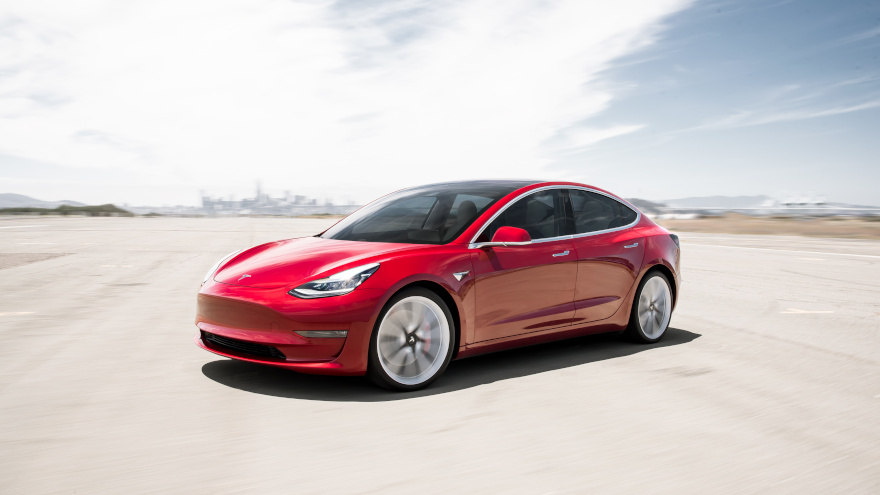EV makers earn owners’ loyalty; registrations reach record high

IHS Markit powertrain analyst Devin Lindsay said that while models such as the Tesla Model 3 (pictured) mature in the market, traditional automakers could roll out multiple models of dedicated EV platforms. Photo courtesy of automaker.
By subscribing, you agree to receive communications from Auto Remarketing and our partners in accordance with our Privacy Policy. We may share your information with select partners and sponsors who may contact you about their products and services. You may unsubscribe at any time.
SOUTHFIELD, Mich. –
New electric vehicle registrations during 2018 more than doubled year-over-year from slightly more than 100,000 to 208,000, according to business intelligence company IHS Markit. EV market share has also seen a strong gain during that period, the company said.
Along with those gains, the loyalty rates of EV buyers has also continued to grow.
IHS Markit said nearly 55 percent of all new EV owners who returned to market during the fourth quarter of 2018 acquired (purchased or leased) another EV. That loyalty rate is up from 42 percent in the previous quarter.
The trend continued into January of this year, with almost 70 percent of EV owners returning to market for a new EV.
“EV loyalty rates have been steadily increasing since their introduction by OEMs,” IHS Markit loyalty principal Tom Libby said in a news release. “This increase over such a short timeframe demonstrates that a portion of the U.S. market is highly accepting of this new technology and has a growing comfort level with it. As more new models enter the market, we anticipate an even further increase in loyalty to these vehicles.”
IHS Markit’s analysis included stats showing increasing strength for the EV sector. The study shows the U.S. market for fully electric vehicles (EVs) has reached record volumes with 208,000 new registrations in 2018.
Subscribe to Auto Remarketing to stay informed and stay ahead.
By subscribing, you agree to receive communications from Auto Remarketing and our partners in accordance with our Privacy Policy. We may share your information with select partners and sponsors who may contact you about their products and services. You may unsubscribe at any time.
The business intelligence company said it was not surprising that 59 percent of these vehicles were registered in California and the Section 177 states — Connecticut, Maine, Maryland, Massachusetts, New Jersey, New York, Oregon, Rhode Island and Vermont — which have all adopted the same vehicle emission standards and have been key markets for EVs as the OEMs have introduced new models. The analysis showed that nearly 46 percent (95,000) of new EV registrations in 2018 were from California.
However, with all the good news for electric vehicles, don’t count out those non-electric brands just yet. IHS Markit says the internal combustion engine is not going away any time soon. The company expects those vehicles to continue to dominate globally until 2030 and beyond.
But IHS Markit provided plenty of additional news that could mean a positive outcome for EV sales. Over the next decade, IHS Markit predicts a strong increase in new fully-electric models offered in the U.S. market. It expects more than 350,000 new EV sales in 2020, which would be a 2-percent share of the total U.S. fleet.
Recent IHS Markit powertrain forecasts show that figure rising to more than 1.1 million vehicles sold in 2025, which would be a 7-percent share.
“A rapid increase in EV nameplates is the catalyst behind the projected growth throughout the next decade,” said IHS Markit powertrain analyst Devin Lindsay. “While relatively successful models such as the Tesla Model 3 mature in the market, other traditional automakers will be rolling out not just one EV as we have seen in the past, but multiple models off dedicated EV platforms.”
IHS Markit expects U.S. consumers to have much more of a choice of EVs at dealerships over the short-term, with traditional manufacturers as well as anticipated market entries from start-up automakers such as Rivian, Lucid and SF Motors.
Any federal government elimination or delay to California’s Zero Emission Vehicles (ZEV) mandate could be the “greatest headwind” for EV sales in the U.S., IHS Markit says. The EPA has proposed to withdraw the waiver, which would affect the ability of California and the section 177 states to regulate greenhouse gases separately from federal standards. That could have a negative impact on the nation’s most popular battery-electric vehicle market, IHS Markit predicts.
Loyalty rates for electric vehicles, per IHS
Q1 2017: 43.4 percent
Q2 2017: 37.4
Q3 2017: 35.5
Q4 2017: 34.3
Q1 2018: 43.2
Q2 2018: 42.4
Q3 2018: 42.4
Q4 2018: 54.8
Q1 2019* 69.9
*Q1 2019 includes January only. Note: Electric vehicles are those powered solely by electricity with no extended range gas support system. Source: IHS Markit.


